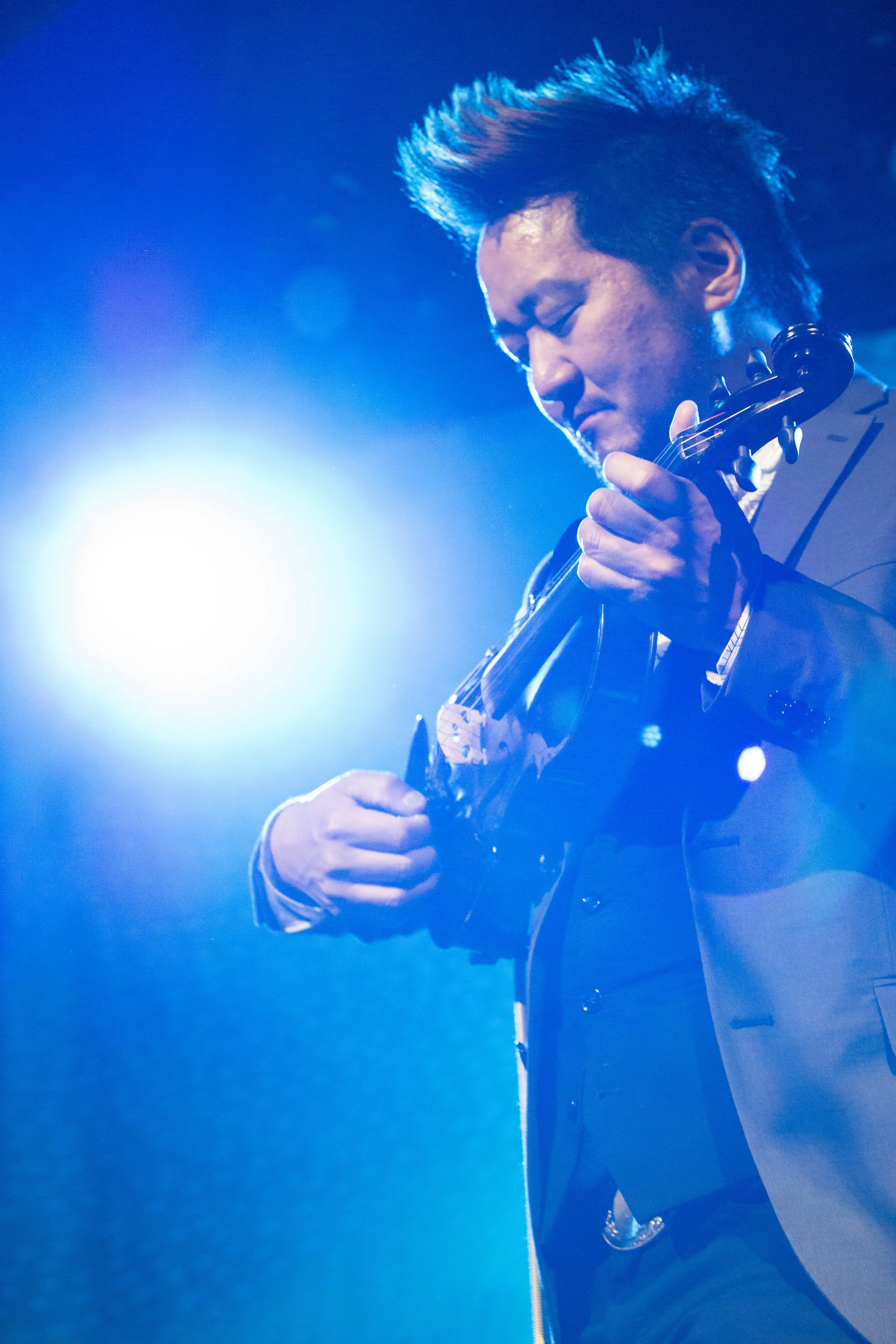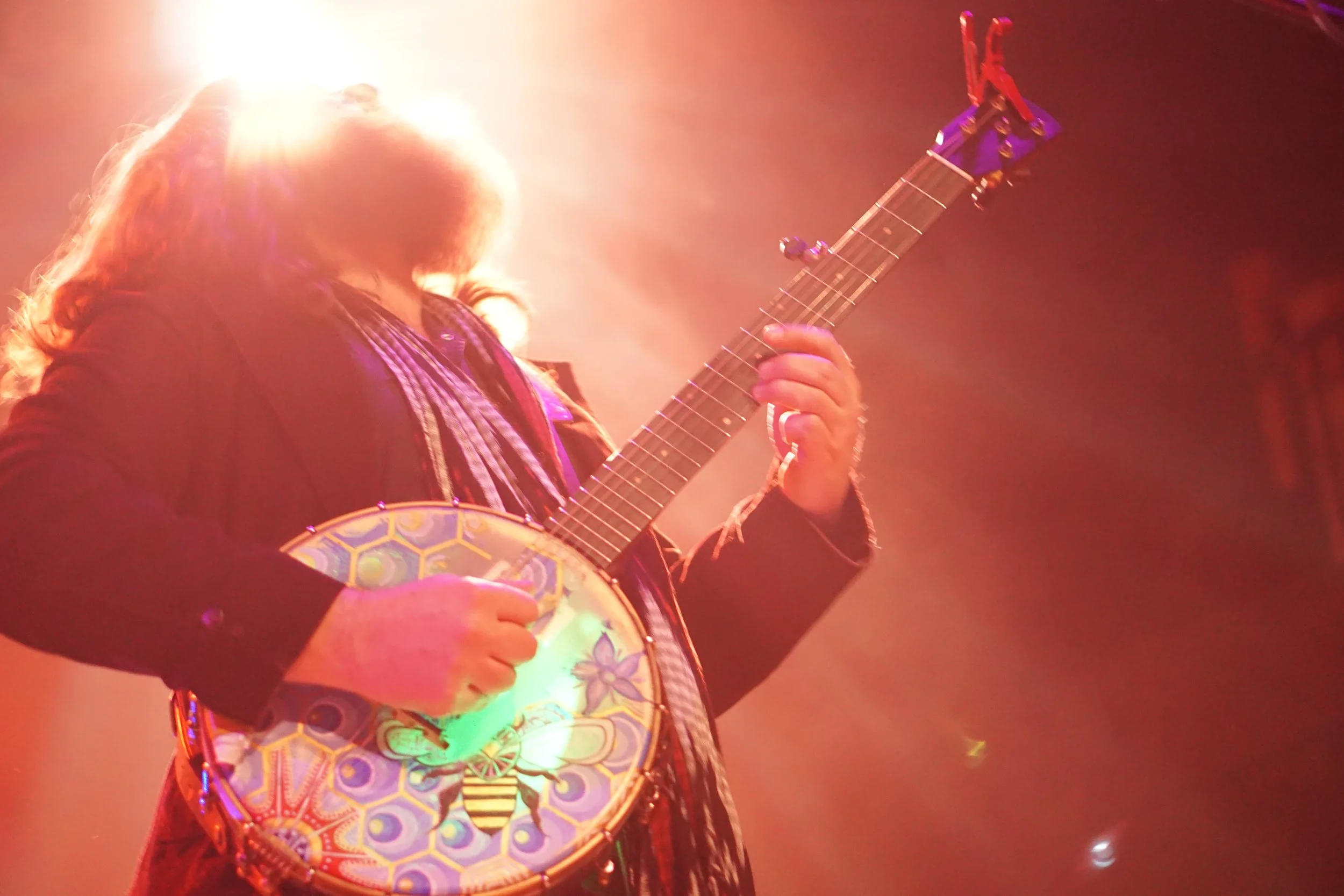Kishi Bashi at the Sinclair, 3/27/22
Concerts are a curious thing. They repeat themselves. Like all things, they repeat themselves. They echo. The first of anything tends to be loud and startling. One’s first-ever concert tends to be that way. Then they start to lose that loudness but we gain clarity. No longer are they as novel and remarkable, but they are more understandable. Maybe that is something that happens with age. I am too young to tell. I am twenty and an amateur music journalist. I can make no claim to know much of anything at all. But this is something that I have started to feel, the loss of loudness and the gain of clarity.
Sunday, the twenty-seventh of March. I get on the Red Line from Davis to Harvard Square and I walk half-aimlessly up to the Sinclair. Sign says: Kishi Bashi. The doors are locked; somehow, I’m that early. That's good with me. I want to get close to the stage, I want to get as close as I can to Kishi Bashi. It just means I need to wait. I find the line and I’m the third in it.
I put on 151a. It’s Kishi Bashi’s first solo album, released 10 years ago. This is the 10 year anniversary tour for that album. I hear that he’s playing the album in full; front to back, to open up his set. The second song from 151a, “Manchester”, is playing on my headphones. It goes: I haven't felt this alive in a long time / All the streets are warm and grey / I read the signs / I haven't been this in love in a long time / The sun is up, the sun will stay / All for the new day
The song is summery, gentle, warm. It makes me feel rosy-cheeked in its gentle cascades and words. But my cheeks are a dry red. A cold, cutting wind whips through the anteplaza in front of the Sinclair, roaring down a Harvard Square street, careening through an agnate alley. The line has grown to about five of us now, and we all huddle against a concrete wall like buzzing insects, hands hiding in our pockets. We talk some excited pleasantries and conversation that coils around the expectations of socialization. The line grows and starts to fray out like a yarn hanging out of my sweater. It falls out farther and farther away from the wall, kiting down the street. The line quivers like a poorly made stop motion film, flickering as everyone in it sways and bounces, bobbing their heads in the cold air.
The opener comes out. Tall Tall Trees. Tall Tall Trees is Mike Savino, Mike Savino is a banjoist, much more than a banjoist, but a banjoist on first description. He is long haired, flowing, his beard meets the rest of it all at his shoulders, forming a picture frame that collects to demonstrate a well flocked hanging mustache that collects around a smooth and intent face. He arrives on stage with an earnestness in his footstep, but also with an excitedness that could almost be mistaken for nervousness. In the strange falsehoods of the way that fans believe that they understand artists as actual, living, breathing people, Mike Savino seems like a wholly and completely inauthentic name for the man on stage. Instead, his stage name seems to describe himself in some sort of self-actualizing nickname. Is this some case of nominative determinism? He appears almost entish. Tree-like. From the angle of us on the edge of the stage, a four foot or so rise off the floor, he appears to have the height only stilts can offer. Through some form of that logic, I agree, and I see Mike Savino as a tall tall tree.
He plays some songs. There's a drummer there as well, but Mike; no, Tall Tall Trees and his banjo are the focus. His banjo is special, an object of a technologized psychedelic bohemia, the artifact of a hippyish recondite doctrine. Blue hexagons with the flourished eyes of peacock feathers, patterned into a red starburst of geometrized teardrops expanding from the baseboard, cascading with a rational excitement, overlaid with an adorned bee, finger friction scraped away in heatmaps of attention to reveal the skin of the banjo that the symbols were painted onto. He plays this banjo as he sings and bounces, and the lights on the inside of the banjo swing across the color spectrum like a sleepy sloth pawing along to his music.
His banjo tickles like a field of punctuation marks, the kind of propulsive music that sends out in every direction while maintaining a contained nature. His voice is smooth but possessed by some sort of clean dustiness, almost like a semi-manicured field of grass being hit by the first fingers of snow in the fall. It's natural, real, and not unwanted, it adds an authenticity, it lends his music an aspect of reality and humanity. The crowd shakes along to it and there's a chatter back and forth after every song. The set feels orbital and annular, the chatter into the music into the chatter again, the rhythm of Tall Tall Trees huddling into the microphone to sing and then bursting away from the microphone in detonations of energy, his hand flying past the strings of the banjo with the drums throbbing into patterns.
His set ends and the crowd drops down in energy into a peculiar partial chatter, with heads passing to the bar and the merch table and the bathroom and turning around to see the venue filling up more and more, with everyone wishing they were closer and glad they are not further back.
The canvas behind the stage is of the face of a girl, set in pensive thought, hands to her chin, lines bursting outwards like when you squint your eyes and look at bright lights. This is that cover of 151a, that album that is now 10 years old in anniversary. At such a scale, the album art is given a certain clarity, or maybe instead that clarity is time passing. It is funny how audiences tend to want to hear older songs while artists tend to want to play newer songs, but, of course, all of those older songs were once newer songs. Things lose their loudness and gain clarity. But here, we lose confusion and gain comfort. We like to know the words to things, and it brings us satisfaction to recognize what we know.
I sit and think and prepare myself, watching the shadows of the stage, until Kishi Bashi comes out to a storm of applause and cheers. I cheer and applaud too, I am excited. I cheer like I did the last time I saw him. The sound from the beginning of “Intro/Pathos, Pathos” is played. I know these noises well. The strings shift like sands. They remind me of dandelion seeds floating over the valley at the breath of a small child on an August morning. Kishi Bashi sings birdsongy calls of wonder. I see the stars of a soft summer night and am brought into the gentle, but magnificent joy of wonder of a soft breeze onto a well pointed sky. Things are repeating themself, I have been here before. Like all things, they repeat themselves. They echo. The first of anything tends to be loud and startling. One’s first ever concert tends to be that way. Then they start to lose that loudness but we gain a clarity. No longer are they as novel and remarkable, but they are more understandable. But not always is that true? I feel a great loudness, looking directly up to see Kishi Bashi’s face singing delicate words. He sings the chorus of “Manchester”, hushing out: I haven't felt this alive in a long time / All the streets are warm today / I read the signs / I haven't been this in love in a long time / The sun is up, the sun will stay / All for the new day
I smile more. His face is lit like a sunset. Warm tones, blue tones, the light of the sky. Brilliant light singing in his hair. He forms a sunrise. Violins swelling like an ocean below the sky of his voice. Noise cast upwards. Cold streets, understandable patterns outside. But here, providing the retention of wonder. Human birdsong on gentle mornings, with smiles as voices and violins provide brilliant horizons.
Kishi Bashi explains the name of his album. 151a; he explains, is a pun. If you sound it out in Japanese, it sounds like ichi-go ichi-e. I’ve heard this before. He explains that ichi-go ichi-e is this idea that no two moments can ever be exactly the same. He explains that it translates to one time, one place. Yes, I’ve read this before.Yes, I remember my amazement on first reading it. I keep that amazement now. I think about the passage of time at the worst time to think. A concert should be for smiling and singing and dancing in your tiny pocket of space. I smile and I take pictures and I mouth along but I also think.
I think back to two years ago, when I was watching Kishi Bashi play. It was at the Royale in Boston and I was there with my mom and dad, except my mom was sick so it was just my dad and I. I didn’t know Kishi Bashi that well then. I knew him because I saw an album of his on a graphic of albums that my friend liked. I saw the collaged cover of Lighght, his second album, and I was struck with curiosity. What was this horse figure on the cover? What was that name, what did Lighght mean, who was Kishi Bashi? And I put the album on, and was faced with delicate joys, the brilliant pop of Kishi Bashi.
So I was there at that concert two years ago. It was spectacular. It was a sunset of every color. It cast against the ceiling and collapsed onto my smiling face. And now at this concert, so much is the same. Kishi Bashi is playing the same songs. In many ways, it is the same experience. But that first Kishi Bashi concert I saw cannot be repeated. Ichi-go, Ichi-e. One time, one place. I remember all the songs and everything I felt. Similar, but not the same. And I break out of thought and explode with bouncing joy hearing Kishi Bashi sing.
The first three songs end, and I put the camera back into the bag. I enter back into the moment of the concert fully. I remember the songs, I remember his anecdotes, I remember the steak costume that danced across the stage, a fixture of every Kishi Bashi concert which comes about when he sings “The Ballad of Mr. Steak”. I remember all these things, but what I remember the most is the thrill enjoying a concert completely, entirely, and absolutely. Sometimes things do lose loudness and gain clarity. Maybe they do. But they don't have to. There is no reason to let loudness be lost. The wonder of everything can be maintained, and everything can maintain wonder. I can maintain my eye on Kishi Bashi, and I can maintain my joy at hearing one of my favorite artists sing some of my favorite songs. I can let myself enjoy a concert absolutely, camera away, thoughts away, letting myself smile and sing along with joy at every moment of the concert’s time. I can let the colors and feelings of the thoughts of the concert combine into one spectacular image of Kishi Bashi singing and playing and dancing across the stage, every moment combined into a landscape of splendor.








